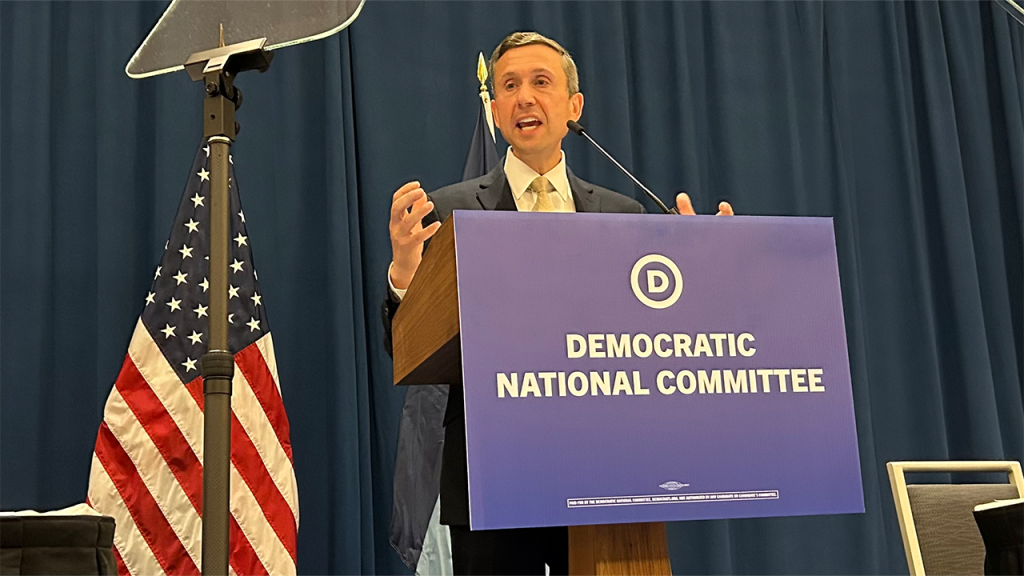DNC Staff Revolt Against Return-to-Office Mandate: A Battle Between Tradition and Modern Work Culture
In a striking display of internal discord, Democratic National Committee employees found themselves under fire this week after expressing strong opposition to Chairman Ken Martin’s directive ending remote work. The announcement that staff would now be required to show up to the office five days a week sparked immediate backlash, with the union representing DNC employees describing the mandate as “callous.” During the staff-wide call where the policy was announced, employees reportedly responded with a flurry of thumbs-down emojis and other visible signs of disapproval. The union’s statement highlighted the disconnect between this new requirement and staff efforts during recent elections: “DNC staff worked extremely hard to support historic wins for Democrats up and down the ballot last Tuesday, and this change feels especially callous considering the current economic conditions.” Martin, however, was uncompromising, reportedly telling employees that if they didn’t like the new policy, they should seek employment elsewhere.
The internal conflict quickly escalated into a public debate, with prominent Democratic figures weighing in against the staff position. Neera Tanden, former domestic policy advisor to President Biden, offered a particularly blunt assessment on social media: “If you think democracy is on the line – working in the office is not a big ask. And there are plenty of other people willing to step up. Get yourselves together people.” This sentiment was echoed by the Center for New Liberalism, which emphasized the demanding nature of political work: “When you accept a job on a campaign, or with an org like the DNC, DCCC, etc, your single purpose is to win the election. It is a demanding job that requires long hours & sacrifices.” The group also suggested that remote workers were likely missing career advancement opportunities by not being physically present in the office, noting that those who make themselves visible “usually tend to go on to do big things.”
Democratic strategist Steve Schale went even further, proposing that the DNC should institute a “requirement that to work at the DNC that you’ve done at least two cycles on an actual battleground campaign, where terms like flex hours & hybrid work don’t exist.” This string of criticism from within Democratic circles revealed a generational and philosophical divide about workplace expectations in political organizations. The controversy also provided Republicans with ample material for mockery. Former Trump White House press secretary Sean Spicer expressed disbelief at the situation, while GOP strategist Matt Gorman joked that the image of “DNC staffers logging onto a Zoom call in their pajamas amid all the chaos of Biden’s reelection is hilarious.” Republican National Press Secretary Kiersten Pels was particularly cutting, asking, “Is this a political committee or a daycare?”
In his defense of the policy change, Chairman Martin explained that the work-from-home arrangement implemented during the COVID-19 pandemic was never intended to be permanent, describing it as a “Band-Aid” that needed to be removed. He did offer some flexibility, stating that remote work would still be considered on a case-by-case basis. The timing of the announcement is notable, coming with a 60-day notice period as allowed in the collective bargaining agreement the staffers’ union had ratified with the DNC over the summer. That agreement had “reaffirm[ed] its commitment to making hybrid work available” while including language permitting a full return to in-person work with appropriate notice. The union has indicated it is examining all options to challenge the measure, suggesting this workplace conflict is far from resolved.
This dispute at the DNC reflects broader tensions in American workplaces as organizations navigate post-pandemic work arrangements. Earlier this year, the Congressional Progressive Staff Association proposed a rotating 32-hour workweek for congressional staffers, arguing it would provide a more “sustainable approach to work on a national level.” That proposal also faced significant criticism, including from Democratic Representative Ritchie Torres of New York, who sarcastically asked, “Why not be bold and ask for a 0-hour workweek?” before wondering “how blue-collar Americans would feel about white-collar workers demanding a 32-hour workweek.” The contrasting reactions highlight fundamental questions about work expectations in modern political organizations.
The DNC staff revolt against returning to the office five days a week represents more than just workplace preferences—it embodies an evolving conversation about work culture, generational expectations, and the nature of political employment. While DNC leadership and many established Democratic figures emphasize the traditional demands and sacrifices expected in political work, younger staffers appear to be questioning whether such expectations remain necessary or beneficial in a digital age. As both sides dig in, this internal Democratic Party conflict mirrors similar debates happening across industries nationwide, where organizations are rethinking the purpose of physical workplaces and the meaning of productivity. With democracy itself frequently invoked in these discussions, the resolution of this seemingly mundane workplace dispute may signal broader shifts in how political organizations operate in the future.















